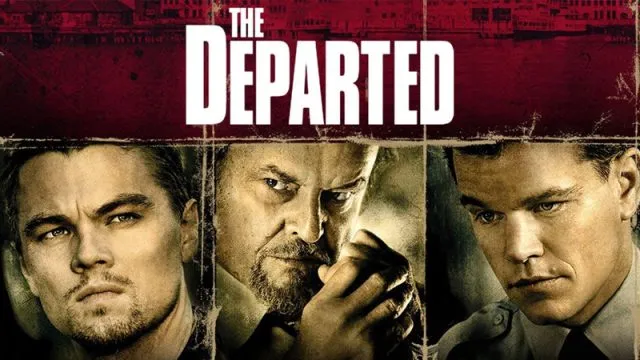It’s award season, which means that, as a resident of Boston, I have the responsibility and privilege to talk about The Departed (pronounced: The Dep-ah-ted). The film won the Oscar for Best Picture in 2007 and earned Martin Scorsese his first, and to date only, Academy Award for Best Director. It is also chock-full of great lessons for corporate innovators.
Quick Synopsis
If you’ve seen The Departed, you can skip this part. If you haven’t, why not and read on.
The Departed is loosely based on notorious Boston crime boss Whitey Bulger and features three main characters:
- Frank Costello (Jack Nicholson), a vicious and slightly unhinged Irish mob boss
- Colin Sullivan (Matt Damon), a Massachusetts State Trooper in the Special Investigation Unit (SIU) formed to catch Costello, who, in his spare time, is a spy for Costello.
- Billy Costigan (Leonardo DiCaprio), a police academy recruit who goes undercover to infiltrate Costello’s organization
But wait! There’s more. Alec Baldwin plays Colin’s SIU boss, George Ellerby. Martin Sheen and Mark Wahlberg (who received an Oscar nomination for this role) play Billy’s Mass State Police (MSP) bosses, Captain Queenan and Staff Sergeant Dignam, respectively. Completing the chaos is Vera Farmiga, who plays Madolyn Madden, Colin’s girlfriend and Billy’s court-ordered psychiatrist.
There’s a lot of other stuff going on, but that gives you enough context for the following quotes to hopefully make sense.
Listen to the words people use.
Colin (after Dignam refuses to hand over undercover files): I need those passwords.
Ellerby: No, you want those passwords
It’s not often that Ellerby says something useful, let alone wise, but he nails it with this one. Colin wants the passwords to Dignam’s files on undercover agents because it will make both Colin’s official job of finding Costello’s rat in the MSP and his unofficial job of finding the MSP officer in Costello’s crew easier. He doesn’t need the passwords, however, because, with enough time and effort, he can find the rats he’s looking for.
When we hear from customers that they want something, it’s tempting to run off and create it. But as Ellerby points out, wants and needs are different. Just because customers want something doesn’t mean they are willing to pay for or change their behavior to get and use it.
Figuring out what a customer needs is difficult because it requires them to trust you enough to admit they have a problem they can’t solve. It’s also difficult because most of us have access to solutions to our functional needs (think the bottom few layers of Maslow’s hierarchy). As a result, the needs consumers grapple with tend to be emotional and social, and it’s far more challenging to admit those to a stranger, especially in a focus group or product-focused interview.
How you feel impacts everyone around you
Madolyn (after a counseling session): Why is the last patient of the day always the hardest?
Billy: Because you’re tired, and you don’t give a sh*t. It’s not super-natural.
Billy and Madolyn get off to a rough start in their first counseling session, culminating in Billy asking for a prescription for Valium. Madolyn calls him out for “drug-seeking behavior” and throws two Valiums across the desk before Billy storms out. A few minutes later, Madolyn catches up with Billy, hands him a prescription for Valium, and asks the above question.
Being a corporate innovator can be difficult, sometimes soul-crushing work (ask the good people at Store 8). It can also be thrilling and inspiring. It can even be all those things in one day. That’s what makes it tiring, even when you give a sh*t.
Managing your energy and monitoring your behavior are leadership qualities we don’t discuss often enough. It’s okay to be exhausted after a day of facilitating ideation sessions or intense strategic meetings. It’s normal to be frustrated after a contentious conversation or demotivated when you get bad news. But leaders usually find a way to not take those emotions out on their teams. And, in the rare instance when they punish the team for someone else’s sin, they apologize and explain.
Your job is not your identity.
Billy: Look, I just want my identity back, all right? That’s all.
Colin: All right, I understand. You want to be a cop again.
Billy: No, no, being a cop’s not an identity. I want my identity back.
Towards the end of the film, Billy is tired of working undercover and reports to MSP headquarters to complete the paperwork required to expunge his criminal record and get his identity back. That’s when Colin makes the same mistake most of us make and confuses Billy’s job with his identity.
We spend so much time at work. We rely on our paychecks for so much. We even introduce ourselves to new people using our job titles. It’s easy for your job to feel like your identity, especially when your job aligns so closely with your deeply held beliefs and values. But your job is not your identity. You are still a Tempered Radical, even without your corporate title. You are still an optimistic problem-solver, even when it’s been months since your last brainstorming session.
You are an innovator, even if you don’t have a business card to prove it.
